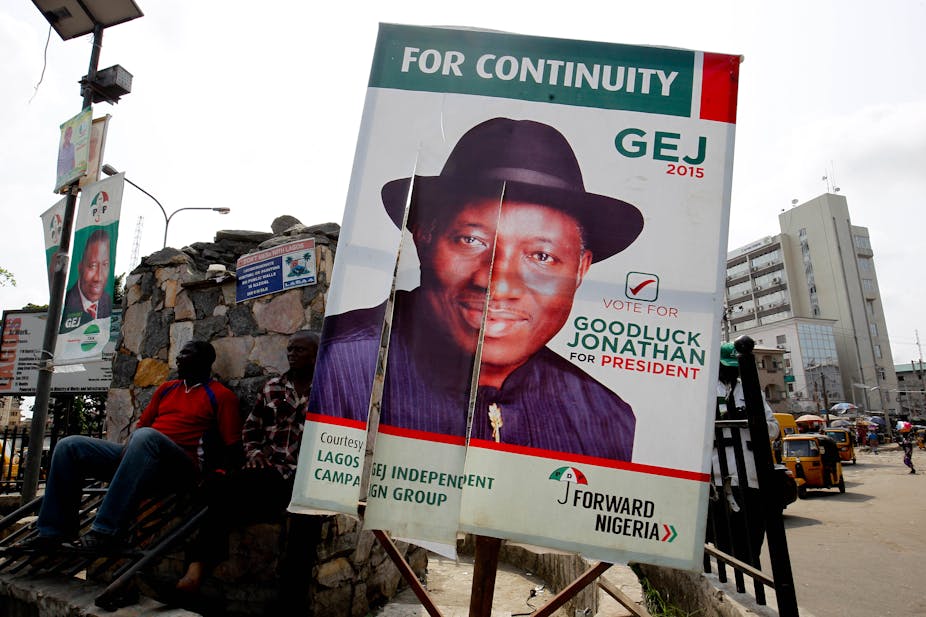The postponement of Nigeria’s general elections has enraged many Nigerians and become a source of concern for both the UK and the US – but it doesn’t come as a surprise to domestic observers of the country’s fragile democracy.
The official explanation chalks the decision up to insecurity, but the political reality is that President Goodluck Jonathan and his ruling Peoples Democratic Party (PDP) are facing their fiercest electoral challenge ever, and they are not preparing in earnest for a life out of power.
The Independent National Electoral Commission (INEC) has postponed the polls by six weeks, citing security concerns and dismissing claims of political motive. Announcing the decision on February 7, INEC chairman Attahiru Jega said the presidential and National Assembly elections have now been shifted to March 28 (from February 14), while the governorship and state assembly elections have been pushed to April 11 instead of the initial date of February 28.
He said this was necessary because the country’s service chiefs had told him that they could not guarantee “the safety and security” of the commission’s planned February polls, because the available military resources are now committed to a six-week intensified operation against Boko Haram in the north east.
President Jonathan welcomed the decision saying it would allow INEC to “conduct credible elections”. He urged Nigerians to take it in “good faith”, and reiterated his “commitment to the sanctity” of the May 29 handover date.
Delay after delay?
The APC presidential candidate, Muhammadu Buhari, had a different take. He said it was a crude and fraudulent attempt to subvert the electoral process, alleging that “the independence of INEC has been gravely compromised”.
And beyond the reactions of the key contenders, many Nigerians are questioning the rationale behind the postponement. Jibrin Ibrahim, director of the Centre on Democracy and Development, argued that the need to stop the insurgency was not a credible explanation.
He said an army that has failed to crush Boko Haram in six years can’t plausibly expect to finish the job in six weeks. As he put it, “If in six weeks Boko Haram has not been defeated, they could call for another delay and ultimately destroy Nigerian democracy.”

Former chairman of West African Bar Association Femi Falana went even further. He claimed that forcing the electoral commission to postpone the polls is a treasonable offence. “By saying that they would not provide security in aid of civil authorities pursuant to section 217 of the Constitution the security chiefs have committed the offence of mutiny contrary to section 52 of the armed Forces Act,” he said.
Both British Foreign Secretary Philip Hammond and US Secretary of State John Kerry have expressed concern over the postponement, and warned against interference in the work of the electoral commission.
Momentum
The government has rejected allegations of electoral interference, but the actions of some of its officials prior to the postponement provided grounds for suspicions.
A few weeks before the postponement was announced, the National Security Adviser Sambo Dasuki had openly called for a delay, citing inadequate provision of voters’ cards. Then, presidential spokesman Doyin Okupe started campaigning vigorously to push the date back; he was soon joined by Edwin Clark, the president’s political godfather, who even called for the removal of the INEC chairman.
Observers say the shift was apparently informed by a feeling that it could favour the ruling party, which has enormous resources to fund a longer and more vigorous campaign to revive its declining fortune. The opposition APC, which appears to have gained some serious momentum, doesn’t have as much resources, and may struggle to compete during the suddenly announced extra six weeks of campaigning.
But the critical responses to the postponement could change that dynamic. If voters think their intelligence is being insulted, they will be determined to defy those condescending to them. Similarly, opportunistic members of Nigeria’s wealthy elite may view the postponement as the desperate grasping of a hapless government that can’t retain power – and if so, they could start shifting their allegiances.
Still, the incumbency factor in Nigerian politics should not be underestimated. It’s one of the most significant determinants of election outcomes, mainly because Nigeria’s key institutions are frail and open to manipulation, and also because the country’s civil society organisations are very weak.
The government’s next steps will be interesting to watch. Regardless of the outcome in the ramped-up Boko Haram offensive, it remains to be seen if the PDP will be content with the postponement alone. Goodluck Jonathan’s uneasy and unpopular party now has a highly suspicious electorate on its hands – and six weeks to placate it.

